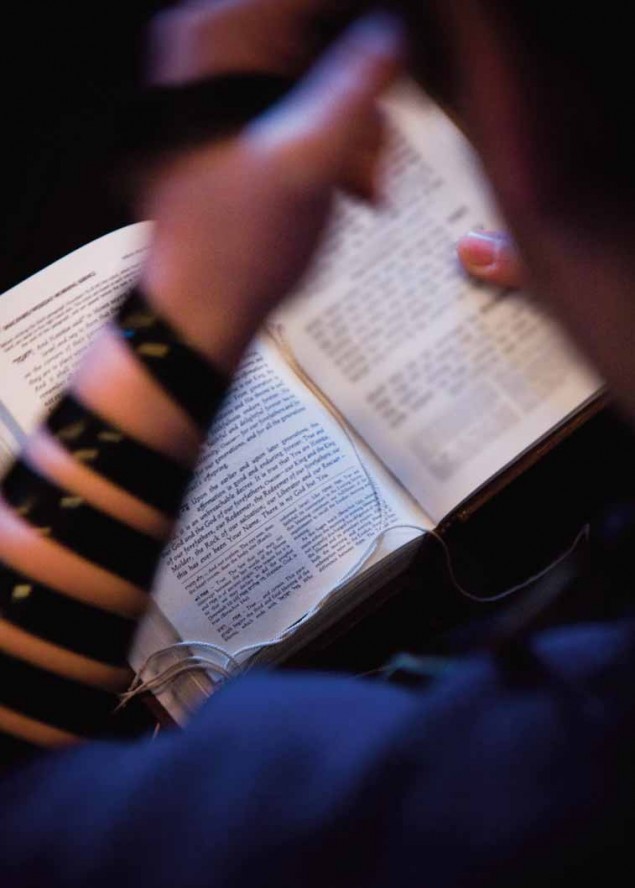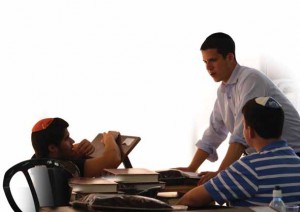Keeping Our Kids on the Derech

Today’s teens often passionlessly and passively go through the motions of living an Orthodox lifestyle. This is true even for those who have spent years in Jewish day schools. The lack of a solid, fervent commitment to Yiddishkeit can cause many, especially those who attend secular universities, to eventually shed Torah observance entirely.
How can we inspire our youth to be passionate and enthusiastic about Judaism? How can we make Judaism meaningful, relevant and exciting? Rabbi Steve Burg, international director of NCSY, the OU’s international youth program, shares his insights, drawing from nearly twenty years of experience working with youth.
Reintroduce God into our schools, homes, and relationships
Some people lead ostensibly Torah-observant lives, keeping kosher and Shabbat and all the other rituals of religious life. But they are not motivated by the desire to lead a spiritually rich and meaningful life. They are simply doing what is expected of them. Their families and friends keep kosher, go to shul on Shabbat, and dress a certain way, so they do the same. Judaism is first and foremost about one’s relationship with the Almighty, not about fitting into a social group.
When I first became West Coast regional director of NCSY, the themes of the Shabbatonim tended to center on various rituals in Judaism, such as keeping kosher and Shabbat. At one point, I made the “radical” suggestion of having God as the theme of our regional Shabbaton. All of the educational content and conversations at the Shabbaton centered on the topic of God (How do we know God exists? What is our responsibility toward God? How should we communicate with God?).
While we spend much time teaching Jewish texts, we spend way too little time emphasizing emunah and bitachon—the very foundations upon which Judaism is built.
The concept of God’s existence is neglected, barely even mentioned in our day schools and yeshivot. While we spend much time teaching Jewish texts, we spend way too little time emphasizing emunah and bitachon—the very foundations upon which Judaism is built. A teen who attends a day school recently confided to me that although she has learned all of the intricacies of hilchot borer in her high school honors dinim class, she is not certain she believes in God. A rabbi I know recently wrote about this very problem. While his bubbie never studied the commentaries on Tehillim, which his daughters all currently learn and know, he wrote, his daughters cannot cry over Tehillim the way his bubbie did.
The dichotomy between our children’s high-level Torah study and their faith in God (or lack thereof) presents a deep and dangerous chasm. As parents and educators, we need to present Torah, halachah, philosophy and Jewish history as part of our relationship with and understanding of God, not as separate subjects that exist in a vacuum. When learning Torah with our children, we must express our own passion and zeal for God, demonstrating that all facets of Jewish learning should serve as a means to draw us closer to God and to better appreciate and love Him.
Learn Torah with your teens
As teenagers are keen social observers, they need to see that their parents value Torah learning. Parents should take time to learn with their children. By studying together, children absorb their parents’ passion and love for Torah.
There is no substitute for the pure joy and spiritual connection derived from learning Torah. The experience of learning, which can be both intellectual and emotional, impacts the learner, irrespective of its practicality. For example, certain gemarot have little practical application to our lives. Nevertheless, the Torah transcends the practical; it’s essence is eternal and it speaks to one’s soul. For 3,500 years, the Torah has been educating, informing, uplifting and comforting the Jewish people. The trick may be in finding the aspect of Torah that speaks to your child at this particular stage of his or her life.
Invest religious life with joy
How do we view mitzvot—as an obligation or an opportunity? Is going to shul a chore? Is Shabbat all about what we can’t do rather than about what it gives us? Mitzvot are great gifts from God, full of meaning that can enrich our lives if we allow them to. To fully appreciate the mitzvot, we also have to think about, talk about and analyze them. The Jews at Mount Sinai said, “na’aseh v’nishma, we will perform the mitzvot even as we strive to understand the deep meanings within them.” If we recognize the mitzvot as gifts and opportunities, and encourage our children to have a more profound understanding of them, they will be transformed from rote motions to precious opportunities to help us connect with God.
Make holidays and Jewish rituals relevant, meaningful and exciting While preparations for Shabbat and yom tov can be arduous, parents need to find ways and opportunities to make these holidays meaningful and exciting. Even with off-tune voices, zemirot bring life and beauty to Shabbat tables and help teens recognize the vitality of Shabbat.
At our Shabbat table, my wife and I give each child (and guest) a choice to either present a devar Torah, sing a Jewish song, tell a Jewish story, or discuss a mitzvah he or she plans to focus on during the upcoming week. Giving children options helps ensure that each child can find something to contribute without feeling anxious. Shabbat meals can become very long affairs with little substance; it is imperative for families to have a set schedule to imbue their Shabbat and yom tov meals with purpose and thoughtful divrei Torah.
Teach the value of genuine prayer
Our yeshivot teach young children about the mechanics of and basic meaning behind tefillah. However, as children grow and mature, the topic of tefillah is rarely revisited. The result is that oftentimes a fifteen-year-old retains a third grader’s understanding of the concept of prayer. This imbalance causes many teens to regard prayer as a burdensome obligation instead of a unique opportunity to develop an ongoing dialogue with God.
As our children mature, we must reintroduce the topic of tefillah and explain that prayer is an extremely challenging mitzvah that requires thought and focus. Encourage teens to think of their needs and desires and form the habit of communicating with the Almighty to express those desires, as well as their thoughts, frustrations, and hopes. We must help our teens cultivate a strong relationship with God through prayer.
It is important for every Jew to develop his own personal relationship with God. Even the Kohen Gadol, the spiritual leader of the nation, had to work to develop his own unique relationship with God. For this reason, he had to offer daily personal sacrifices in addition to the communal sacrifices he offered on behalf of the entire Jewish people. This continuous personal interaction ensured that the Kohen Gadol maintained his own ongoing relationship with God. If the Kohen Gadol, who spent every day in the Temple had to constantly renew his relationship with God, shouldn’t we, who are daily occupied with mundane things, recharge our spiritual batteries?
Embrace unconditional love
When a baby is born, parents often have an entire life trajectory planned for that child to follow. Children, however, generally grow up to determine their own pathways. Often, the path a child chooses does not fit the dreams and plans that his or her parents had hoped for. In this situation, it is critical that parents refrain from judging their child and continue to demonstrate their unconditional love.
During a recent visit to Israel, I met with an influential rabbi who told me about his child who was struggling religiously. Consequently, this rav traveled to the kever of a tzaddik where he fervently recited Tehillim for two days. The rabbi looked me squarely in the eye and said, “You probably assume I went to the kever to daven for my son. Really, I was davening to the Almighty for myself, to give me the strength and patience to continue to love and support my son.” We may not always agree with the choices our children may make, but we must remember that they will always be our children. Furthermore, we must ensure that they know we are always there for them, even when we disagree.
Rabbi Steven Burg, the international director of NCSY, is also the founder of the Jewish Student Union (JSU), a network of 250 public high school clubs that reaches more than 15,000 unaffiliated Jewish teens. Rabbi Burg also serves as the managing director of the OU.


